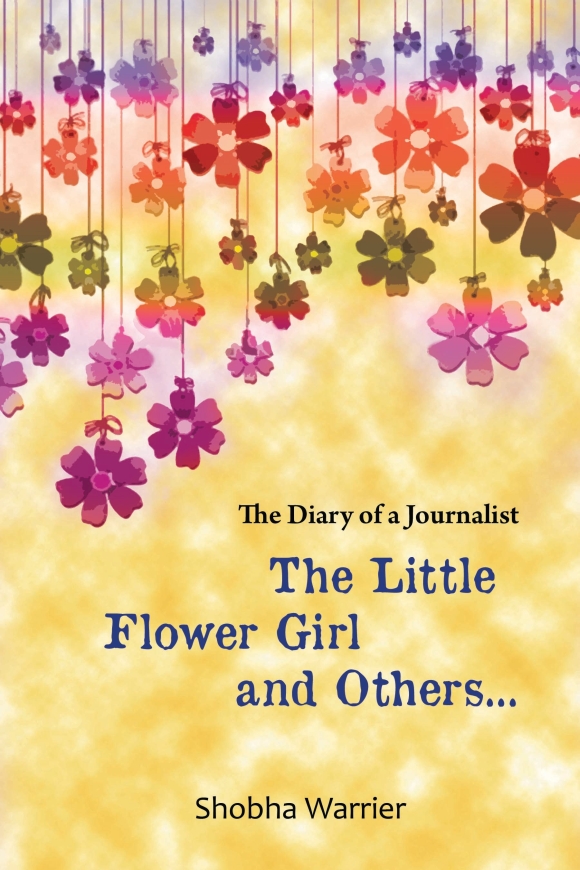 | « Back to article | Print this article |
'Dumping! It is such a cruel word'
During her long career, writer-journalist and Rediff staffer Shobha Warrier has come across people of varied hues, many of whom have left a lasting impression on her.
Warrier narrates the fascinating stories of some of them in her recently-released book The Little Flower Girl and the others -- Diary of a Journalist.
The book was formally released in the capital during the recently held World Book Fair by Minister of State for Human Resource Development Shashi Tharoor. Warrier read out excerpts from her book to a gathering of close friends and colleagues as well as publisher Renu Kaul Verma (Vitasta Publishing).
The Little Flower Girl is really an account of her encounters with the marginalised, those that society ignores like sex workers, gay men, transgender people -- "They never leave your mind," she says, stories that made her really sad. Many of their stories altered her perceptions of certain pariah groups she had preconceived notions about. "You may think transgenders are very aggressive, or may have a very stereotypical image of a sex worker, but when they bare their hearts to you, it is heart wrenching.". But more than sadness, the stories have been written to give a voice to the invisible and the voiceless, Warrier underlines.
Warrier decided on a career in journalism after a "fateful" meeting with Malayalam magazine Kalakaumudi editor N R S Babu nearly three decades ago. Fresh out of college she joined the magazine and embarked on a journalistic journey, meeting not only celebrities and political leaders, but also the poor and the excluded.
"I have always been inspired to write about the people I meet in course of my assignments. I have written their life stories, like a journalist would keep diary entries," says Warrier. The idea to file together all the stories into a single compilation hit her by chance. "The book just happened," she explains.
Says Tharoor: "Written in a very simple and direct language, it is a very unique and remarkable collection,"
We present an excerpt from the book:
On Her Lonely Journey
She, a thin, frail old woman, was standing quietly in her pooja room looking all around as if she were trying to absorb every nuance of the room when I reached her house early at 9 in the morning. She moved from there to her bed room, stood there for a full minute with her eyes closed. She continued her unsteady walk to all the rooms in her house, and then sat on the canvas chair which had been hers ever since her husband died.
'Oh, you have come? Sorry I was looking at everything in my house for one last time," she noticed me only then. "I am not taking his photos from here. I am sure he would not have liked to move from this house. After all, we lived in this house together for many decades. Yes, we had our fights; many of them, in fact. When he was alive, I never thought that I would miss him so badly." She tried hard to hold back tears but they welled up in her cataract affected eyes.
Her well placed only son -- only child -- had flown in from abroad, taking a day off from his "important business meetings" to personally take her away from her abode. No, he was not planning to take the lonely old lady with him so that he could look after her in her old age. She was being taken to an old age home where many men and women like her are dumped. (Dumping! It is such a cruel word.)
Click on NEXT for more...
'He could not sense the unspoken words'
He asked the watchman to keep all her belongings - a couple of suitcases - in the car. He was worried that they would get delayed for his return flight. Actually he was in a hurry; he had to admit her in the old age home and then catch an evening flight back. He had many important meetings to attend to the next day; nothing could be postponed.
"Why are you sitting here? Shall we go? If we miss this flight, I will miss my evening flight too," he said in his low, sophisticated voice.
She didn't seem to hear him. Or was she pretending?
"Will he be angry with me for abandoning him here in this house?" she was referring to her husband. "I don't think so. He knows how difficult it is for me to manage such a big house on my own. I am in my late seventies... an old woman!"
Why was she telling me all this? What was she to me? Other than staying in the same colony, we had nothing in common. Other than visiting her in the evenings after my walk, we had no relationship. It had come to such a stage that she would wait for me every evening, keeping her door open with a bottle of cold water and a glass near her. She knew I liked to have a glass of cold water after the walk. She had reached such a lonely stage in her life that waiting for a stranger like me, someone who was in no way related to her, was something to look forward to in her life. Strange are relationships in life.
Her son was getting impatient with the time she was taking, too much time, looking at and touching each object in the house. I was reminded of a Malayalam film called "Thingalazhcha Nalla Divasam" (Monday, the auspicious day) made by the late Padmarajan in the eighties. The film was about the loneliness an old mother felt despite having several children. They together decided to sell the old ancestral home and the day they chose to dump their mother in an old age home was a Monday. Hence the title, Monday, the Good day! There is a scene in the film in which the old mother walks in the courtyard looking at the trees and the place where her husband was cremated.
Similarly, this old woman also kept on looking at every object in the drawing room. "This is where he used to sit all the time, reading " she whispered and got up.
She herself locked the house. I could see her fingers trembling. As she walked towards the car, she fumbled and when she was about to fall, it was the driver who jumped to hold her and not her son. The man who learnt to walk holding on to her fingers once did not even see her wavering steps. The man who learnt to speak listening to her could not sense the unspoken words that came from her.
As the car slowly moved away, I saw her looking at her house one last time with tears in her eyes.
(July 2009)
Excerpted from The Little Flower Girl and Others - Diary of a Journalist by Shobha Warrier. Published by Vitasta Publishing Pvt Ltd.
Click on NEXT for more...
TOP photo features of the week
Click on MORE to see another set of PHOTO features...


